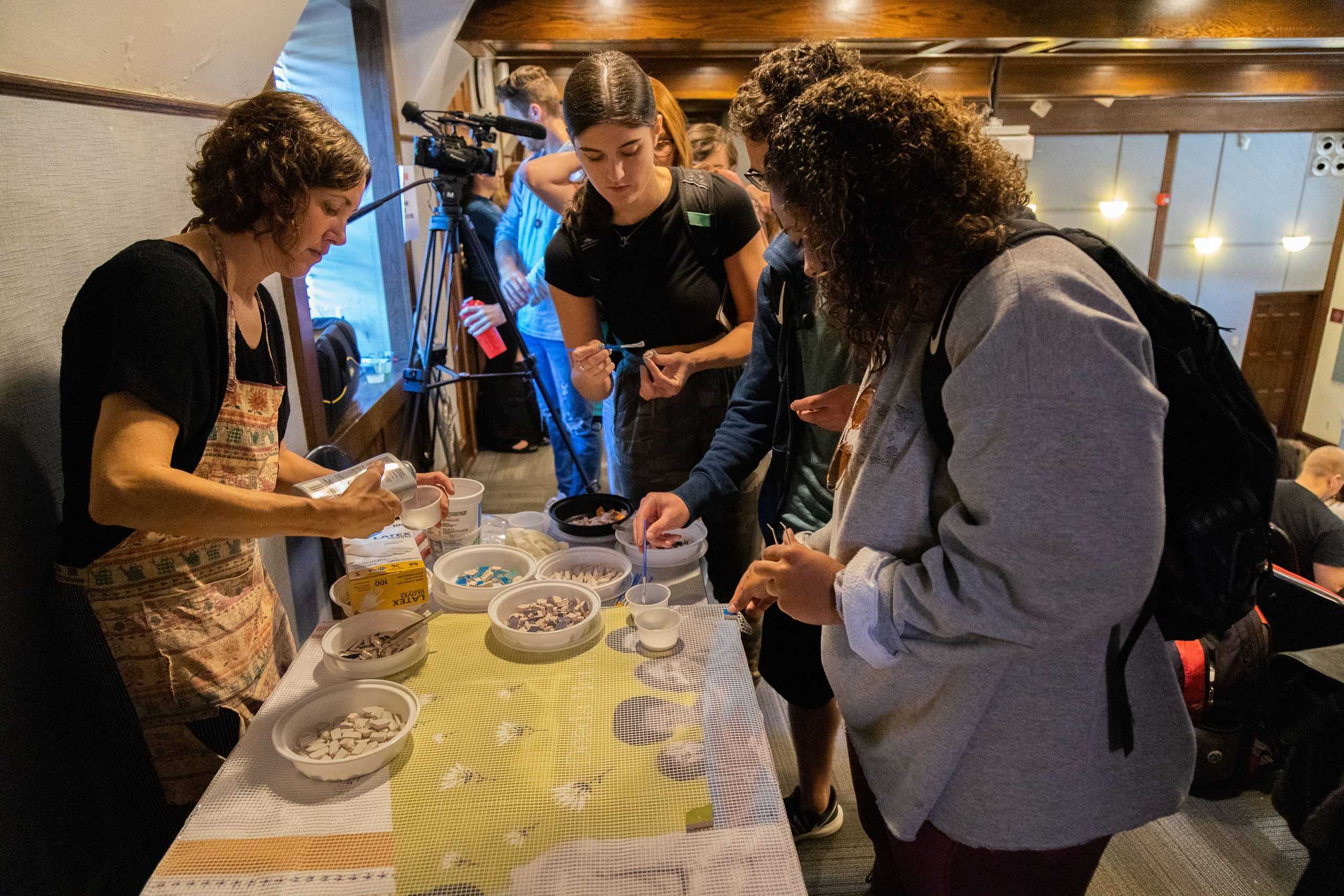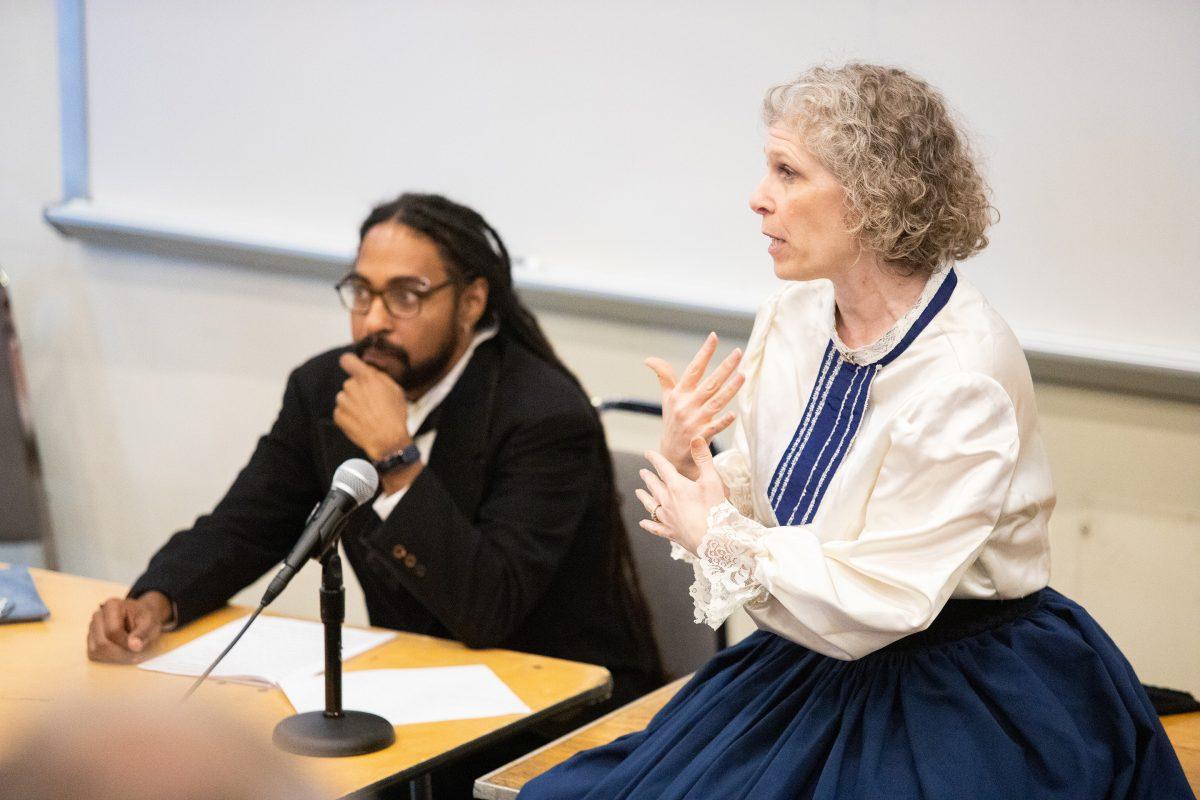The departments of political science, history and art collaborated on a project that reenacted a debate between historical figures Elizabeth Cady Stanton and Frederick Douglass in Barbelin Hall on Sept. 17.
The debate reenactment is the first of a planned series of events aimed at communicating the importance of voting. Brian Yates, Ph.D., associate professor of history, played Douglass, author, abolitionist and social reformer, and Susan Liebell, Ph.D., associate professor of political science, played Stanton, an abolitionist and women’s rights activist.
Liebell said one of the objectives of the reenactment was to demonstrate to students the importance of voting, ahead of the 100th anniversary of the 19th Amendment which granted women the right to vote.
“Pre-law, Justice and Ethics in the Law, and other departments are going to collaborate on things that highlight citizenship, voting, the importance of voting, and we hope to dovetail it with getting students registered to vote in elections,” Liebell said. “Students have been this voice that everyone has always said has so much potential that is never realized in elections because [college students] don’t show up for elections.”
Liebell said that even though she likes lectures, she thinks it is important to be able to hear the actual words of a historical figure. She also said having her and Yates dressed up in clothing from the late 1800s was a way to generate interest and to keep the audience engaged.
Hearing the actual words of Douglass through the debate was meant to reinforce the importance of voting and engaging in political activity.
“We see the stakes of black men not voting very clearly in Douglass’ words, and the stakes are very similar today, for not only black men, but also all women, and all members of communities that need protection,” Yates said.
Yates said Douglass was a central figure in the history of the abolitionist movement, and embodied the movement’s key themes of confronting American hypocrisies, utilizing Christian theology and fighting for equality.
“This is because, in my view, Douglass is one of the finest human beings America has [produced],” Yates said. “It’s important that, as historians, people actually get the words and actions of the [historical figures] as opposed to just basing one’s views of what other people think.”
Liebell also invited Jill Allen, M.F.A., visiting assistant professor of ceramics, to contribute to the project on behalf of the art department. Allen said she created a mosaic inspired by a quote from Alice Paul, a leader in the Women’s Suffrage Movement.

The quote reads: “I always feel the movement is a sort of mosaic. Each of us puts in one little stone, and then you get a great mosaic at the end.”
The mosaic was based on an illustration of Alice Paul surrounded by multiple patterns.
Allen said that she speaks most comfortably through visual arts and thinks it is an effective way to convey the message to students.
“A lot of people respond in a visual way to visual language by seeing things, by seeing art, by seeing sculpture and participating with it,” Allen said.
Allen said her mosaic is a metaphor for how one person can add to the greater good like every person does by adding their vote.
“The more every little person can contribute you’ll have something beautiful in the end,” Allen said.
Allen said she hopes to have the mosaic at future events, and that students will add to the mosaic so that at the end of the series it will be finished for the community to view.
“Right now, if you were to look at it you wouldn’t see a lot of pieces added,” Allen said. “You can start to see the color and the form taking shape [as] more people see the piece they’ll add a piece and it’ll start to become more apparent what the image is and what the overall piece is meant to look like.”
Liebell wanted to use women’s suffrage as a platform to make students understand the importance of voting. “It’s using the 100th year of women’s suffrage to integrate voting as an important political activity and a source of political power in the United States and beyond,” Liebell said.
Correction: A previous version of this story stated that Liebell said “Pre-law, justice, ethics and other departments…” Liebell said “Pre-Law, Justice and Ethics in the Law, and other departments…”





































